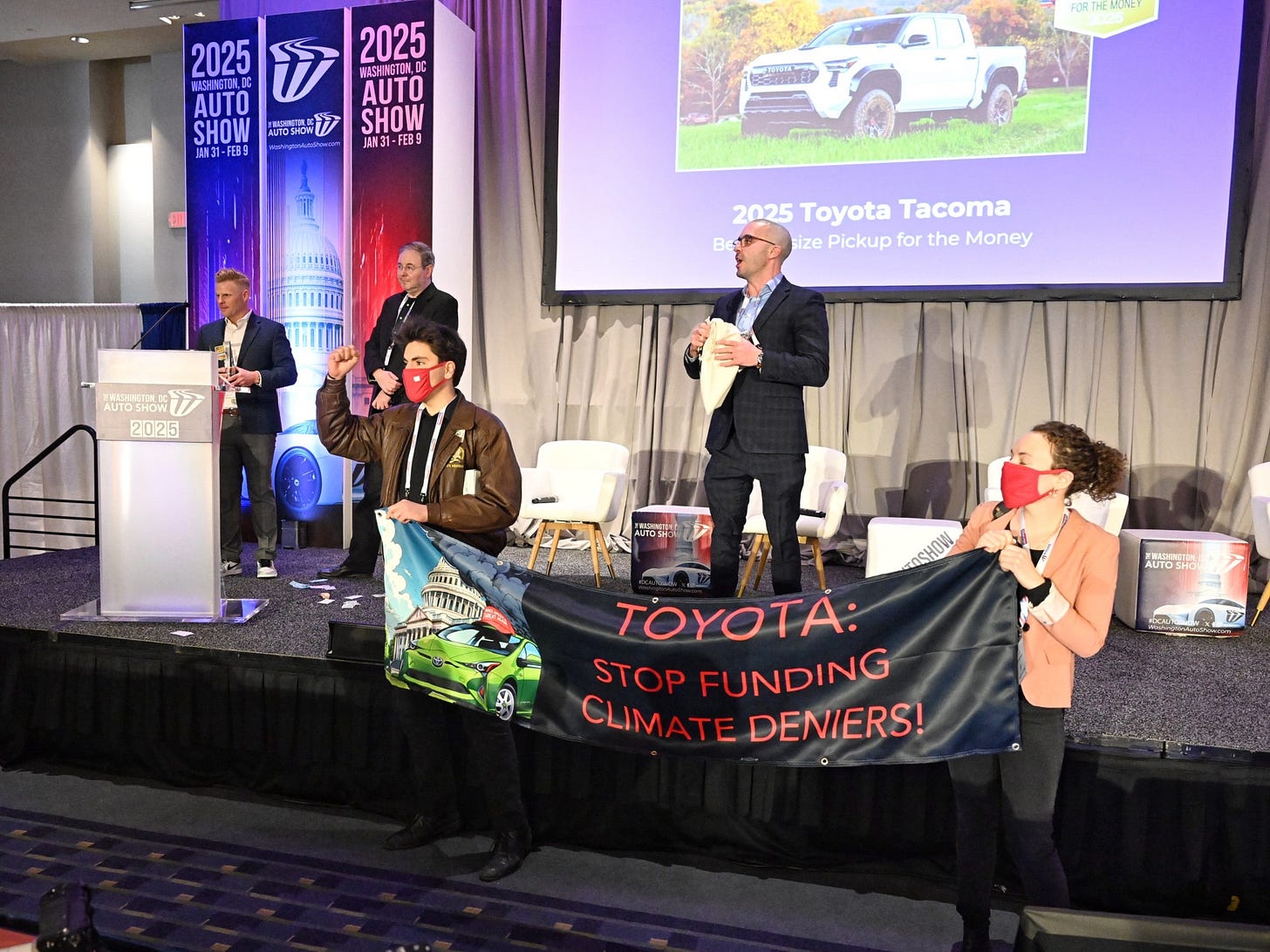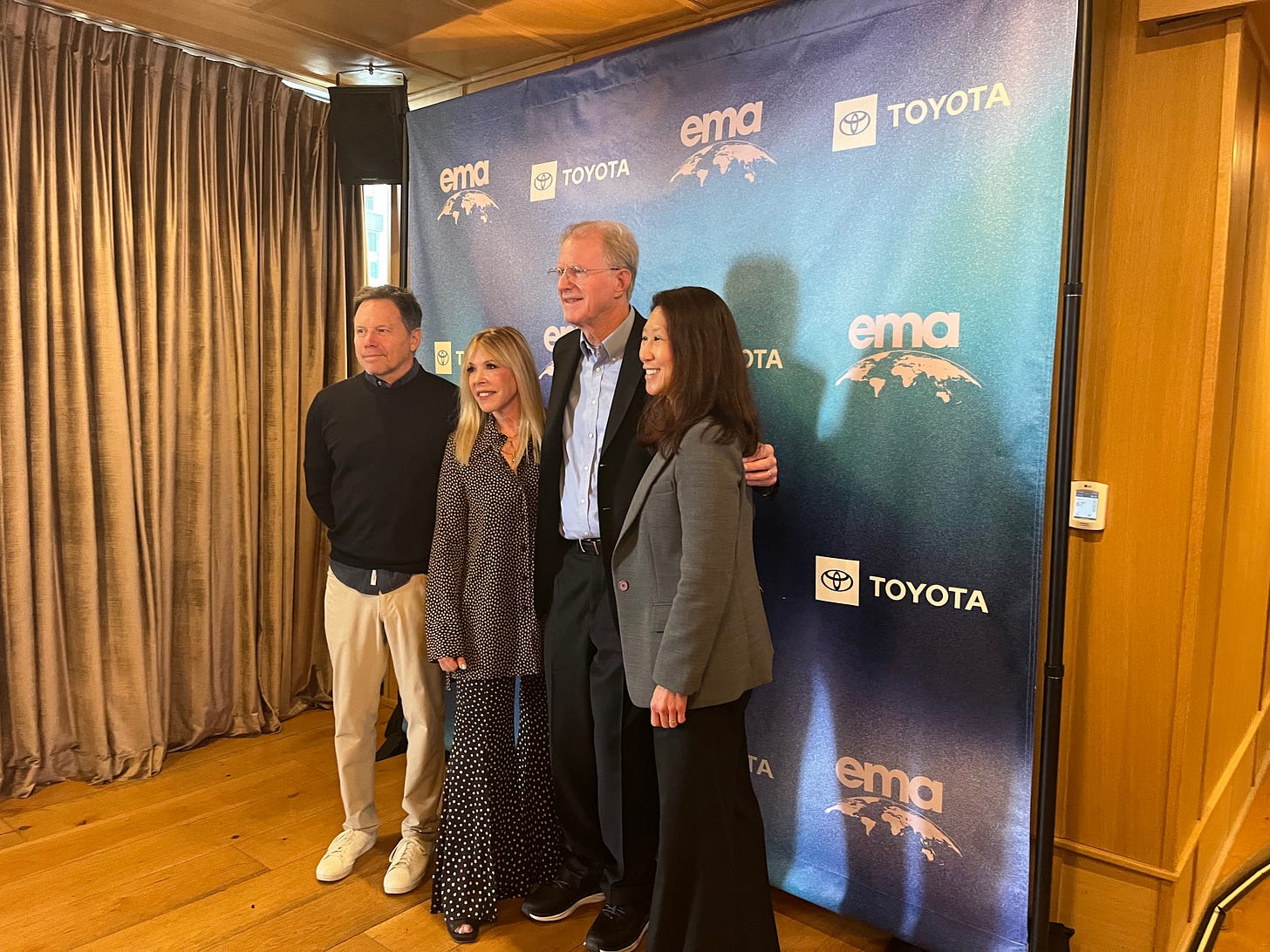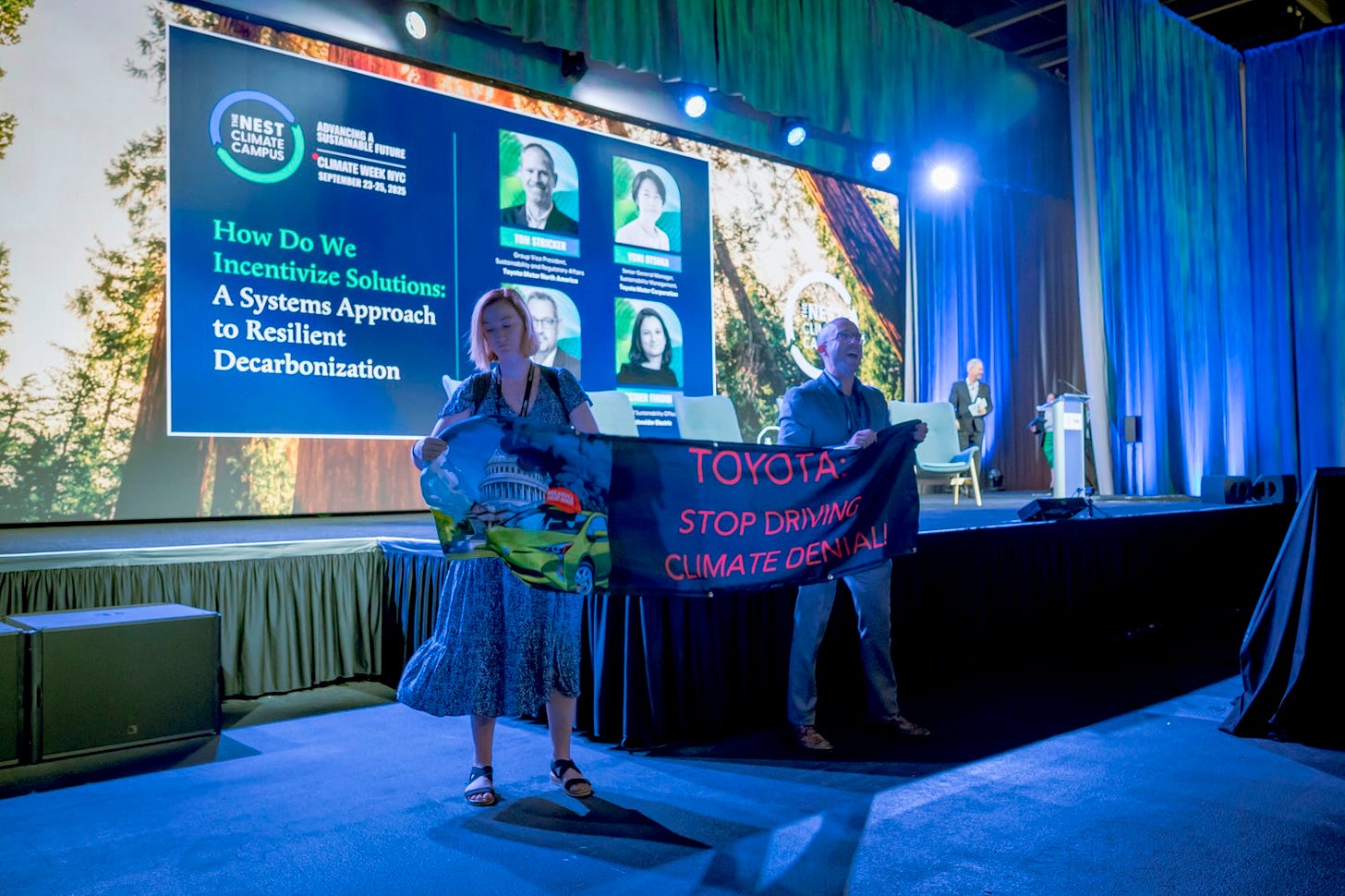Hollywood pumps the brakes on Toyota
The entertainment industry's leading sustainability group says privately it will cut ties with its top sponsor, after critics accuse Toyota of funding climate denial.
This is the first edition of Climate-Colored Goggles, a newsletter about climate and culture. My name is Sammy Roth, until recently a climate columnist for the Los Angeles Times. Thank you for joining me.

Toyota was once a climate darling, its Prius a sustainability status symbol for celebrity drivers including Leonardo DiCaprio, George Clooney and Meryl Streep. For many Americans, Toyota still embodies environmentalism.
But in truth, the company has so tarnished its green reputation that some of Hollywood’s leading environmentalists no longer want to be associated with it.
In stark contrast to other automakers, which have invested heavily in electric vehicles, Toyota has remained stubbornly wedded to hybrids, which get more miles per gallon than gas-only cars but still burn heat-trapping, lung-damaging gasoline. Toyota also funds more climate deniers running for Congress than its auto industry peers, according to consumer advocacy group Public Citizen.
“Toyota is the largest automaker in the world and one of the worst electric vehicle laggards in the world,” said Adam Zuckerman, a campaigner with Public Citizen. “They are attempting to ensure that electric vehicles do not become the future.”
They are, however, attempting to portray themselves as environmentally friendly — which is why it’s such good news that Hollywood’s leading sustainability group appears poised to cut ties with Toyota, its premier sponsor.
The Environmental Media Association’s apparent decision — which I’m reporting exclusively in this newsletter, based on messages sent by EMA leadership — can be credited partly to actor and climate advocate Jane Fonda. She and other entertainment industry figures urged EMA to stop taking Toyota’s money, as part of a quiet pressure campaign led by Public Citizen.
“I was so proud in 1998 when I bought one of the first Toyota hybrid electrics in the U.S.,” Fonda said in an emailed statement. “How devastating it is today to learn that Toyota has become one of the most extreme anti-climate companies, regularly opposing emissions regulation and betraying the public trust the company had built over the years. Shame on Toyota.”
That kind of rhetoric seemingly caught the attention of EMA’s leadership, including longtime CEO Debbie Levin.
In an email this summer — which was later forwarded to me by a source — Levin wrote that her group would be “pulling away from Toyota moving forward.”
A few weeks later, an EMA board member said in a text message that the group’s contract with Toyota ends in December 2025 and would not be renewed. (The same source sent me a screenshot of the message.)
When I reached out to Levin, she declined to confirm my reporting. But she did refer to the Toyota relationship in the past tense, writing, “we had a wonderful and globally impactful partnership for 25 years. I love and respect so many of the people that I met and worked with.”
“It’s time to move on and find other ways to lead in industries,” she said.

Toyota representatives didn’t respond to my request for comment. But I can’t imagine they’re thrilled.
For 25 years, EMA has counted the Japanese automaker as a top sponsor. If you follow EMA on social media, read EMA’s emails or attend an EMA event — as I did last year, covering a summit headlined by Hillary Clinton — there’s a strong chance you’ll hear how wonderful Toyota is, for consumers and for the planet.
For many years, it was true. Hybrids were a climate solution.
Long before electric cars were widely available, EMA worked with Toyota to popularize the Prius among entertainment industry trendsetters — and thus the wider public. As Levin told the Hollywood Reporter, “My mission was, we can make the car so cool that if you didn’t buy it, you didn’t care about the environment.”
Her plan worked. If you watched a lot of movies, TV shows and awards shows in the 2000s, you probably saw a lot of hybrids.
The partnership was a wonderful example of how Hollywood can use storytelling to encourage sustainable behavior. That’s exactly why EMA exists.
But today we live in a world of increasingly catastrophic heat waves, fires, droughts and floods. Scientists say we should be racing to cut global greenhouse gas pollution nearly in half over the next five years — and transportation is America’s largest source of emissions. Climate experts see a limited role, at best, for newly purchased cars that burn gas — even plug-in hybrids.
“When you look at solutions for how do we hit climate targets, how do we avoid the worst impacts of climate change, it’s really about switching to something that truly has no emissions,” said David Reichmuth, a scientist at the Union of Concerned Scientists.
Toyota, unfortunately, has chosen a different path.
In 2024, just 1.2% of Toyota’s light-duty vehicle sales in the U.S. were fully electric, compared to roughly 8% of all new cars sales nationally, according to the International Council on Clean Transportation. Globally, a meager 1.4% of Toyota’s sales were fully electric last year.
Over the last three election cycles, meanwhile, Toyota contributed to the campaigns of 207 climate-denying congressional candidates, per a Public Citizen analysis. That was significantly more than either General Motors or Ford, the only other automakers with federal political action committees.
Zuckerman noted that Toyota has supported undoing California’s clean vehicle rules and weakening federal fuel efficiency mandates — all while laundering its reputation at events like last month’s Climate Week NYC.
“The greenwashing they’re doing allows them to continue to build dirty cars and fund climate deniers, while getting the benefit of continuing to look like a climate-friendly company,” he said.

Although I wasn’t at Climate Week myself, I saw Toyota’s greenwashing firsthand at last year’s EMA IMPACT Summit.
Sitting in a hotel event space packed with actors, influencers and communications professionals, I listened with incredulity as Toyota representatives took the stage and made the case for hybrids. They described the oil-fueled cars as a way to protect the planet without asking consumers to adopt a new technology.
“We want to give our customers options, and we also really strongly feel that hybrid is kind of the stepping stone to help people make a difference,” Toyota marketing manager Heather Willis said.
Climate experts and advocates tell a different story.
“The only technologies to align road transport with a [safe climate] are zero-emission vehicles,” said Dale Hall, a program lead at the International Council on Clean Transportation.
By sponsoring groups like EMA, Toyota is engaging in cultural battle against those types of inconvenient truths. That’s how greenwashing works: When a company wants to counter negative perceptions about its products — like Big Tobacco back in the day — it finds trusted messengers and pays for the privilege of associating with them. If it can buy endorsements, even better. There’s a reason you see so many celebrities doing commercials for gas-guzzling SUVs.
Sure, most people haven’t heard of EMA. But the group is backed by a who’s who of major studios, including Amazon, NBCUniversal, Paramount, Disney and Warner Bros. The speakers at last year’s EMA summit included Rainn Wilson (Dwight Schrute on “The Office”), Bonnie Wright (Ginny Weasley in the “Harry Potter” films) and Ted Danson (too many great roles to list). Within the industry, EMA is known for its Green Seal, a checklist that encourages studios to adopt sustainable practices on set, such as installing solar panels and providing reusable water containers.
In other words, there’s a reason Toyota wants to be associated with these folks. They do valuable and necessary work. They’re trusted in Hollywood.
So kudos to EMA for seemingly choosing to dump Toyota — especially in a political environment as volatile as this one, when entertainment companies have come under fire from the Trump administration.
There shouldn’t be anything political about an environmental nonprofit deciding to move on from a sponsor. But sadly, in President Trump’s America, almost everything is politicized. The culture wars are omnipresent. A comedian is temporarily kicked off the airwaves after offending the president. A U.S. citizen is removed from a baseball playoff game after an opposing fan threatens to call ICE. The National Park Service is forced to rewrite history.
In the next edition of Climate-Colored Goggles, I’ll discuss why — amid the absolute insanity of life in 2025 — I’m starting a newsletter about climate and culture.
For now, to quote The Wire’s Avon Barksdale, just dream with me.
The Environmental Media Association will presumably need a new sponsor. Who do you think would be a good fit? An automaker more committed to EVs? Maybe a solar or wind developer? Some other type of company or organization?
Send me your ideas, and I’ll include my favorites in a future newsletter. Check out EMA’s website for inspiration, and feel free to get creative; there no bad ideas. Maybe Climate-Colored Goggles can play matchmaker!
Because wiping out greenwashing is only half the battle. If we want Hollywood to tell better stories, we need to make sure it’s learning from trustworthy storytellers.



Watch Chris Paine's 2006 (yes I said 2006) documentary, "Who Killed the Electric Car?" to see environmentalists work to prevent Toyota from crushing its early RAV4 EVs. We saved roughly 800 of these great zero-emission cars. Toyota has been aggressively anti-EV for roughly as long as the EMA has accepted their sponsorship.
Finally, Toyota is being called out for their greenwashing. We have been fighting this company since 2003 when they were recalling all their leased RAV4 EVs and crushing them. We saw through their lies over 20 years ago, even held protests at their Torrance headquarters and their Santa Monica dealership, resulting in the saving of several hundred EVs that would have been destroyed. Many of those ancient EVs are still being driven after two and a half decades.
The recent Tesla takedowns organized and attended by well-meaning, but terribly misinformed liberals upset with Elon Musk's hard right political switch resulted in fewer people switching to EVs. The oil companies sold more gasoline to those people than they would have had they made the switch. Tesla has directly taken over 8 million gas cars off the road, and indirectly they've taken tens of millions more off the road since it's Tesla that forced the entire global auto industry to go electric. So, to hurt Musk, these liberals ended up helping sell more gasoline, and that gas was burned resulting in more pollution.
It's time for good liberals to go after the real enemy, companies that sell gas-burning cars, and Toyota is the worst of the worst in that sense having sold over 10 million in 2024 alone. Organize Toyota takedowns throughout the country. No self-respecting Democrat, liberal, progressive, or leftist should ever buy a gas car again. The most effective weapon we have is the right to choose clean cars over dirty.